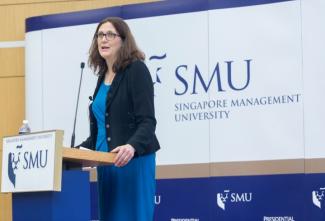
“Free trade, fair trade is not just a slogan for Europe; it is in our DNA since our foundation in 1957. In a troubled time for global trade, we will stand up for the prosperity and progress it promises. We will stand up for the benefits it offers our citizens. We will stand up for the multilateral, rules based system that underpins it. We are prepared to take a stand, to show leadership. And we are reaching out a hand to all those around the world who feel likewise,” declared Ms Cecilia Malmstrom, European Union (EU)’s Commissioner for Trade at the first Presidential Distinguished Lecturer Series in 2017 at the Singapore Management University on 8 March 2017.
Speaking to 300 students, diplomats, government officials and the SMU Community on The Future of EU Trade Policy in Asia, Ms Malmstrom said that the EU, which marks its 60th anniversary this year since the Treaty of Rome in 1957, is the world's biggest trader and the world's biggest recipient and source of foreign direct investment. Its economies are among the world's most competitive, and are turning the page after difficult years following the financial crisis, with all member states set to grow this year.
“We recognise the role that openness brings to our economy. We do not see trade as a game you win or lose, but as an opportunity where we both win,” said Ms Malmstrom. “We do not see globalisation as something we must either oppose or submit to; but something we can harness and shape, for greater shared prosperity.”
She said that free trade creates jobs, and free trade deals expand those opportunities further, as cutting tariffs helps the least well-off in society who spend most of their income on basic goods which are often imported. She warned that reversing the trend of openness, returning to isolation and protectionism, would simply mean that the most vulnerable would have fewer jobs and would have to pay higher prices.
Praising Singapore as a symbol of open trade, Commissioner Malmstrom said Singapore’s “decision to embrace openness has transformed a tiny island without natural resources into one of the richest economies in the world. That openness has attracted investment, including from the 11,000 European businesses who have made a home here.”
She noted that Singapore is a significant hub for the EU and is one of its top 20 trading partners for goods, and a top 10 partner in foreign direct investment. She hoped that both the EU and Singapore can continue to make progress in other areas of collaboration, such as the EU-Singapore Partnership and Cooperation Agreement, and the bilateral agreements on the exchange of tax information which Singapore is signing with many EU member states.


[Caption: Students, diplomats, government officials and the SMU Community listened in rapt attention at Ms Malmstorm’s speech.]
Ms Malmstrom said that with both the Transpacific Partnership (TPP) and EU’s own proposed trade partnership with the US wrapped in uncertainty, the EU is determined to advance its own trade talks with partners around the world by “pursuing an ambitious agenda of trade negotiations”. It has already seen some results, with the trade agreement with Canada set to enter into force this month, an agreement with Japan is close at hand, and talks with Mexico and the Latin American Mercosur bloc to be accelerated.
Turning to ASEAN, Ms Malmstrom said the bloc, as a single economy, ranks among the world's biggest, and is the EU's third largest trading partner. As the EU and ASEAN celebrate 40th anniversary of formal relations, the EU is the biggest investor in the region and ASEAN's third largest trading partner. Since 2009, ASEAN's exports to the EU have doubled.
The EU’s trade agenda is gathering momentum in the ASEAN region too. In 2014, Singapore became the second Asian country, after South Korea, to conclude a free trade agreement with the EU. The EU has already concluded a bilateral agreement with Vietnam; it is currently in negotiations with Indonesia and the Philippines; and has been in talks with Malaysia about resuming the free trade negotiations. Ms Malmstrom also expressed strong support for the ASEAN Economic Community.
Ms Malmstrom ended her speech by emphasising that the EU trade policy is transparent, engaged and democratic; it is also based on values, such as human rights, the rule of law, protecting the environment, equality and gender rights.


In a lively Question and Answer session moderated by SMU President Professor Arnoud De Meyer, Ms Malmstrom fielded numerous questions from an enthusiastic audience, including the likelihood of another member state withdrawing from the EU; advice for women planning to enter politics; transparency of the Transatlantic Trade and Investment Partnership between EU and USA; and how to harmonise overlapping trade agreements.
[Featured Photo: Ms Cecilia Malmstrom delivered the first lecture of the SMU Presidential Distinguished Lecturer Series in 2017.]